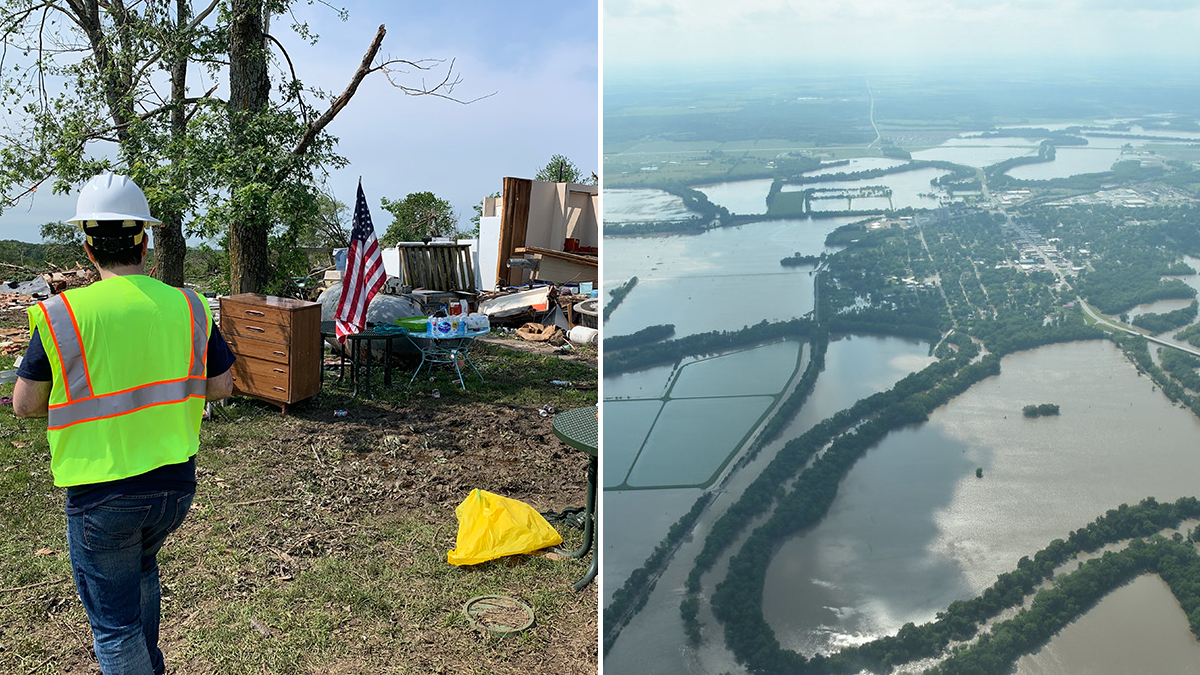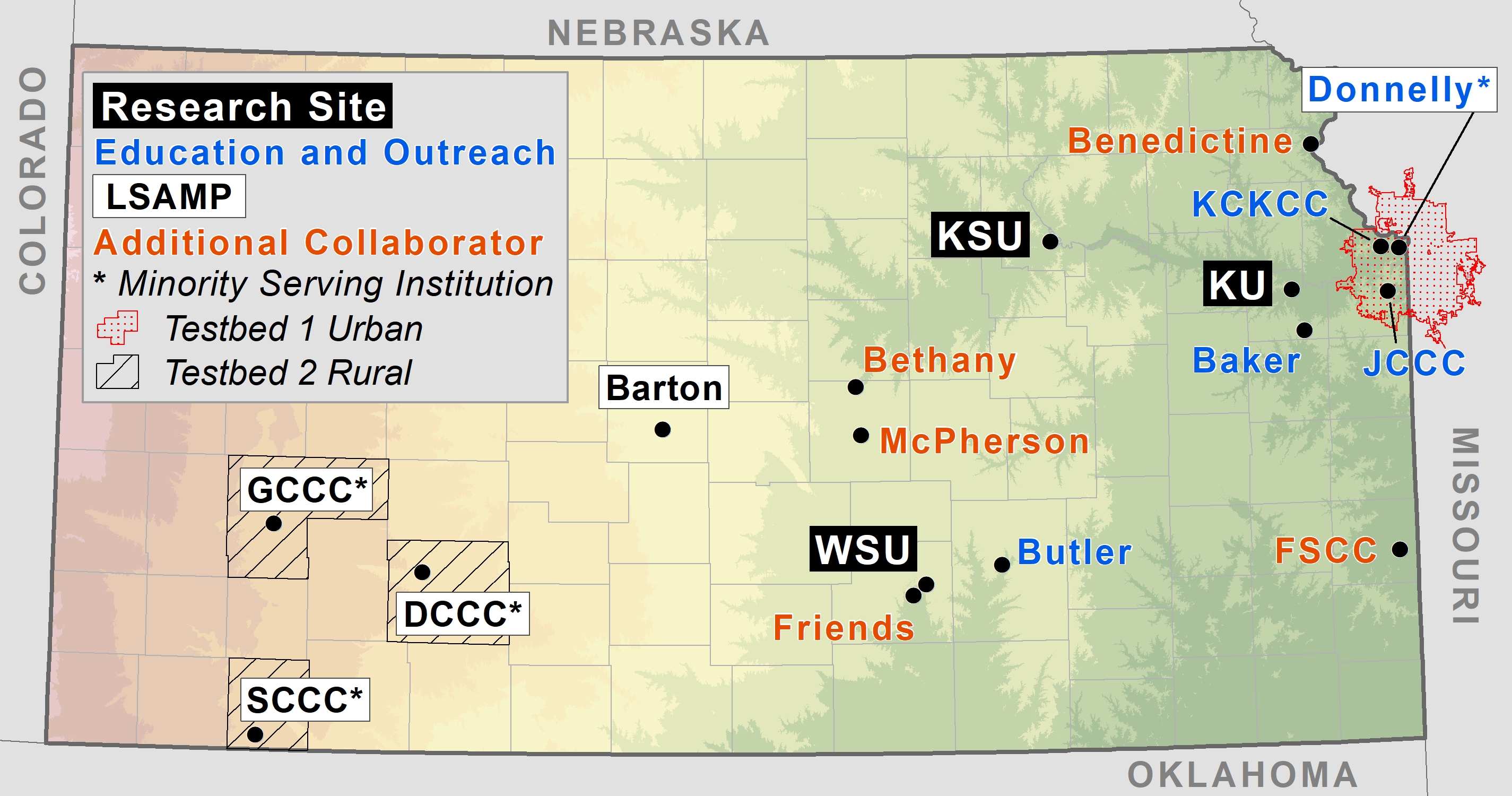KU to lead $24M statewide investment to advance research on resilient and socially equitable infrastructure

LAWRENCE – Kansas currently ranks ninth in federal disaster declarations per capita. Amid changing climate patterns and frequent extreme weather events, historically underserved communities often receive less aid and recover slower from weather disasters.
Now, a new statewide initiative leveraging $20 million from the National Science Foundation and $4 million from the state of Kansas will address this disparity by developing tools that help communities with limited resources prepare for and bounce back from disasters. The project aligns with the Kansas Science & Technology Plan, which was developed in 2021 and endorsed by the Kansas Board of Regents, who provided matching funds for the NSF proposal.
University of Kansas researchers will collaborate on the project with 16 other universities and colleges in the state, as well as with business leaders, emergency planners, health professionals, community-based organizations and other stakeholders.
“Kansans are rightly proud of their ability to recover from natural disasters, but the state faces disasters of a kind and at a frequency we’ve not seen before,” said Simon Atkinson, vice chancellor for research. “The factors that determine resilience are complex and can only be tackled by working across traditional disciplines and leveraging the intellectual resources of all the state’s research universities. That’s why this award from NSF is so important.”
The award is through the NSF’s Established Program to Stimulate Competitive Research (EPSCoR) RII Track-1 program. NSF uses EPSCoR to level the playing field for areas in the country whose scientists receive a lower percentage of federal support.
KU will lead the EPSCoR project — called Adaptive and Resilient Infrastructures Driven by Social Equity (ARISE) — engaging faculty, staff and students from engineering, social science, economics, computer science and other fields.
ARISE aims to advance the resilience of social and economic systems and physical infrastructure, including the systems that support transportation, water and energy sectors across urban and rural areas. It will leverage academic research capacity in Kansas to transform rural and vulnerable communities typically underrepresented in research.
“The ARISE project lays out a case for infrastructure and community resilience to be guided by principles of social equity and active collaboration between government, industry, not-for-profits and communities,” said Belinda Sturm, professor of civil, environmental & architectural engineering and principal investigator on the grant. “The project not only builds academic research that converges computer science, engineering and social science, but the project will support community-engaged research across Kansas to create sustaining relationships between universities and communities.”

The initiative will be spread over five years, creating capacity for research and education within and between KU, Kansas State University, Wichita State University, community colleges, outreach programs, community engagement and extension offices, and workforce development programs.
“This project provides an incredible opportunity to put Kansas researchers at the forefront of cutting-edge community disaster resilience research in a way that builds protection and increased access for and with the people of Kansas,” said Elaina Sutley, associate professor of civil, environmental & architectural engineering and co-principal investigator on the project.
The project also aims to develop education resources from K-12 to higher education, creating new opportunities in science and technology for Kansans. The project will create an interdisciplinary data science consortium that partners with Kansas businesses and organizations and trains students to translate their skills into data-driven solutions.
Since 2006, KU has received 12 NSF EPSCoR awards totaling more than $96 million.
KU’s EPSCoR program will mark its 30th anniversary this year. Not only has it jump-started the careers of more than 100 new faculty members, but for every dollar NSF EPSCoR pumps into research, Kansas receives more than double that in non-EPSCoR research funding.
Top image: The split image shows the destruction from the tornado in Linwood and flooding of the Fall and Verdigris rivers near Neodesha, both in 2019. Credit: Elaina Sutley and Mike D’Attilio of the Kansas Division of Emergency Management.
Middle image: Participating institutions on ARISE, with initial rural and urban testbeds highlighted. Research-intensive universities leading the research initiatives are highlighted in black; community colleges and universities participating in education and outreach initiatives are in blue. Partnering community colleges are highlighted in a white box. Unfunded collaborators are noted in orange. Organizations classified as minority-serving institutions are labeled with a star.